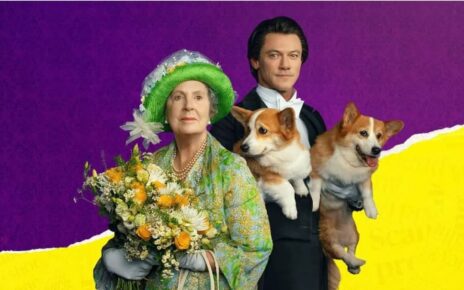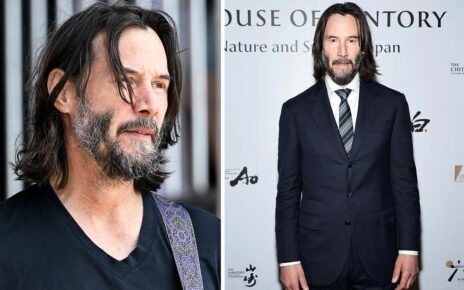Embed from Getty Images
There’s something about Rosamund Pike I’ve always found a little bit unsettling. I can’t put my finger on what it is. Maybe it’s because she’s good at playing characters who are mentally disturbed, like in Gone Girl. She has a new BBC audio drama coming out with Hugh Laurie called People Who Knew Me. It’s also a fictional story about a woman who vanishes–she works in the Twin Towers and when 9/11 happens, her family presumes she’s dead, so she disappears to California and assumes a new identity. It sounds interesting. I love podcasts, and they’ve more or less replaced television for me. But the way she talks about the audio recording has me second guessing if I can tolerate it. She also had some things to say about “wellness” culture and the nonsense of Goop, which was pretty satisfying to hear from an A list star. So many of them toe the party line on “alkaline water” and cutting out this and that food group “for gut health” that it’s nice to hear someone in Rosamund’s position saying “wellness is BS.”
What attracted you to People Who Knew Me?
It’s a remarkable story and one I felt emotionally drawn to. Anyone who’s ever told a lie quickly finds that in order to support it, you have to tell another, then another. Here is a woman in her early 20s who has been lying and having an affair. At the point of the cataclysmic horror of 9/11, she has a job in the World Trade Center. She realises that everyone will assume she was at work that morning and will have died, so sees an opportunity to escape. There’s a curiosity in all of us: “What happens if I go out to get a pint of milk and don’t ever come home?” Or maybe that’s not in all of us and I’ve just exposed myself!
How was it working with your co-star, Hugh Laurie?
I was delighted when Hugh wanted to do it. He’s always been a face I’ve known and obviously House is where he perfected his brilliant American accent. On screen, you could’ve been distracted by the fact that it’s Hugh Laurie, but as a voice, you just accept it. He becomes the character. Someone’s fame doesn’t get in the way with audio.It feels naturalistic and soundscaped. How did you record it?
With head mics attached to these fetching head-bands, so we could be very free and move around. Our voices sound different in various locations – in cars, across restaurant tables, even in the bath. Technically it’s quite a leap forward from the radio dramas one might have heard growing up. You’re very much in the moment with our characters. If somebody cries, we don’t try to hide sniffles. If somebody’s eating, we hear them slurp ice-cream or bite into an apple. It’s a lot more immediate and immersive.The script includes satirical mentions of Gwyneth Paltrow’s Goop. Do you have much truck with wellness?
I think we’re all being conned by the wellness industry. This idea that it’s no longer enough to be healthy and we have to be “well” is something that needs to be interrogated. Yet it’s so seductive because it’s in pursuit of things that people are ashamed to want, like youth, beauty and fitness. #MeToo gave women an opportunity to escape some of the demands put on them. Now, in a way, people are voluntarily flocking back to being controlled but in a different guise, by these wellness claims. It’s politicised our food, politicised our exercise and I think it’s really dangerous.
[From The Guardian]
The way she describes the audio recording, with sounds of people eating, made me nauseated. I really hate hearing eating noises from myself or other people. I think it would be very distracting. Besides which I find Hugh Laurie too smarmy, I guess. As for what she says about the wellness industry, I think she’s right. It is weird how the advent of wellness has made us say “I’m doing X behavior because it’s easier on my digestion” instead of “I’m doing X behavior to lose/maintain weight.” It’s also changed how advertisers write ads for all these different diets, detoxes, workout programs, supplements, and so on. We’ve come up with ways to hide our true motivations because striving to lose weight or look younger is a form of vanity, and Western culture has always been hard on vain women. In the Victorian era, women did things like wetting red tissue paper and using it as rouge, because actual makeup wasn’t “respectable.” They had to find clever ways to skirt that line.
To me the ‘wellness’ stuff is similar. You’re supposed to be just vain enough to be attractive in a way that is perceived as “natural”. If you try too hard, you’ll get punished for your visible effort. If you are perceived as not trying hard enough, you don’t care about “wellness” or you’ve “let yourself go”. It’s exhausting. The wellness that Gwyneth Paltrow and her fellows promote is just diet culture wearing a more chilled-out, friendly mask. Once you peel back the mask, it’s usually the same old ethos of restriction, arbitrary food rules, and really problematic concepts of purity and things being “clean”, which icks me out big time.
Embed from Getty Images
Embed from Getty Images
Embed from Getty Images
Source: Read Full Article


